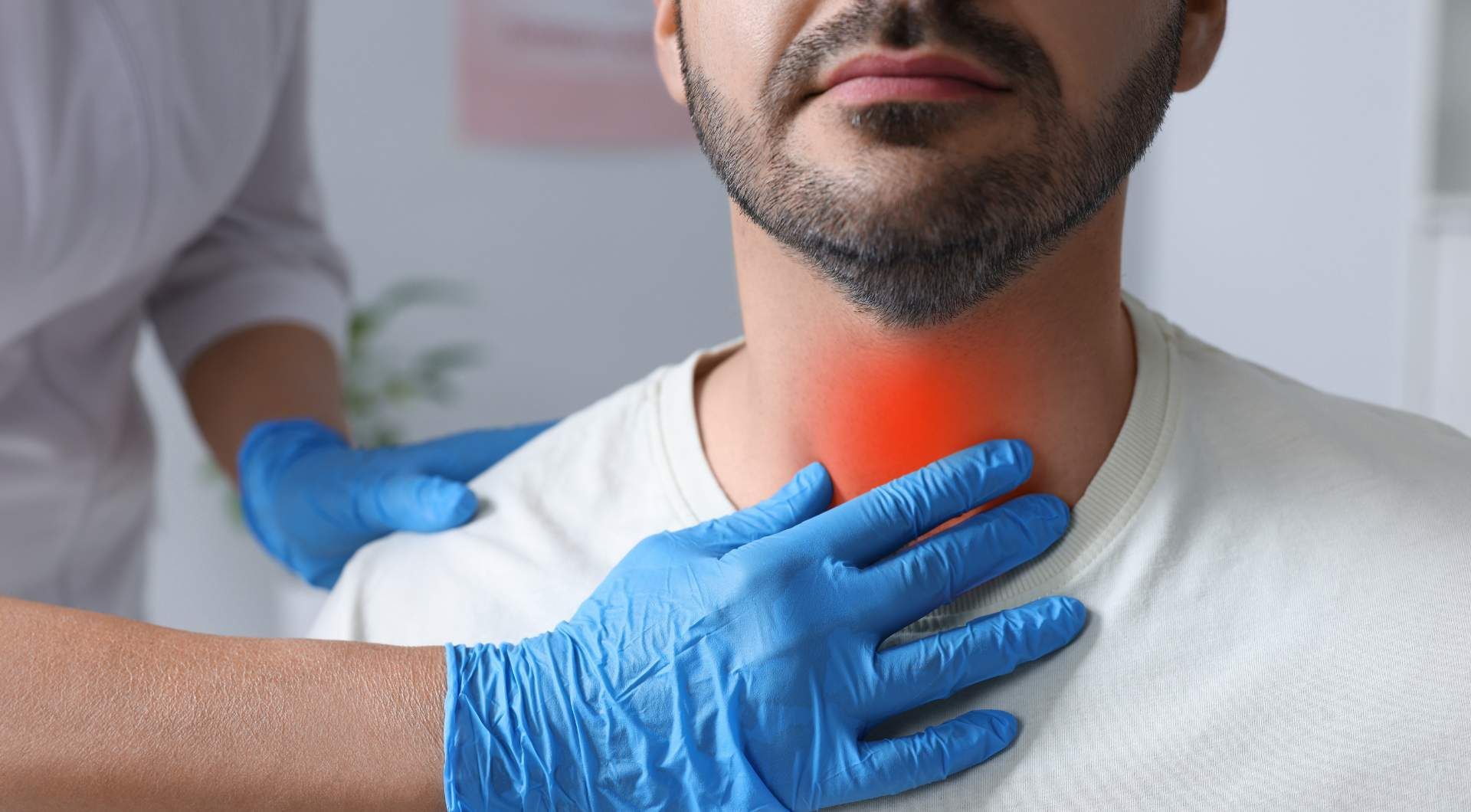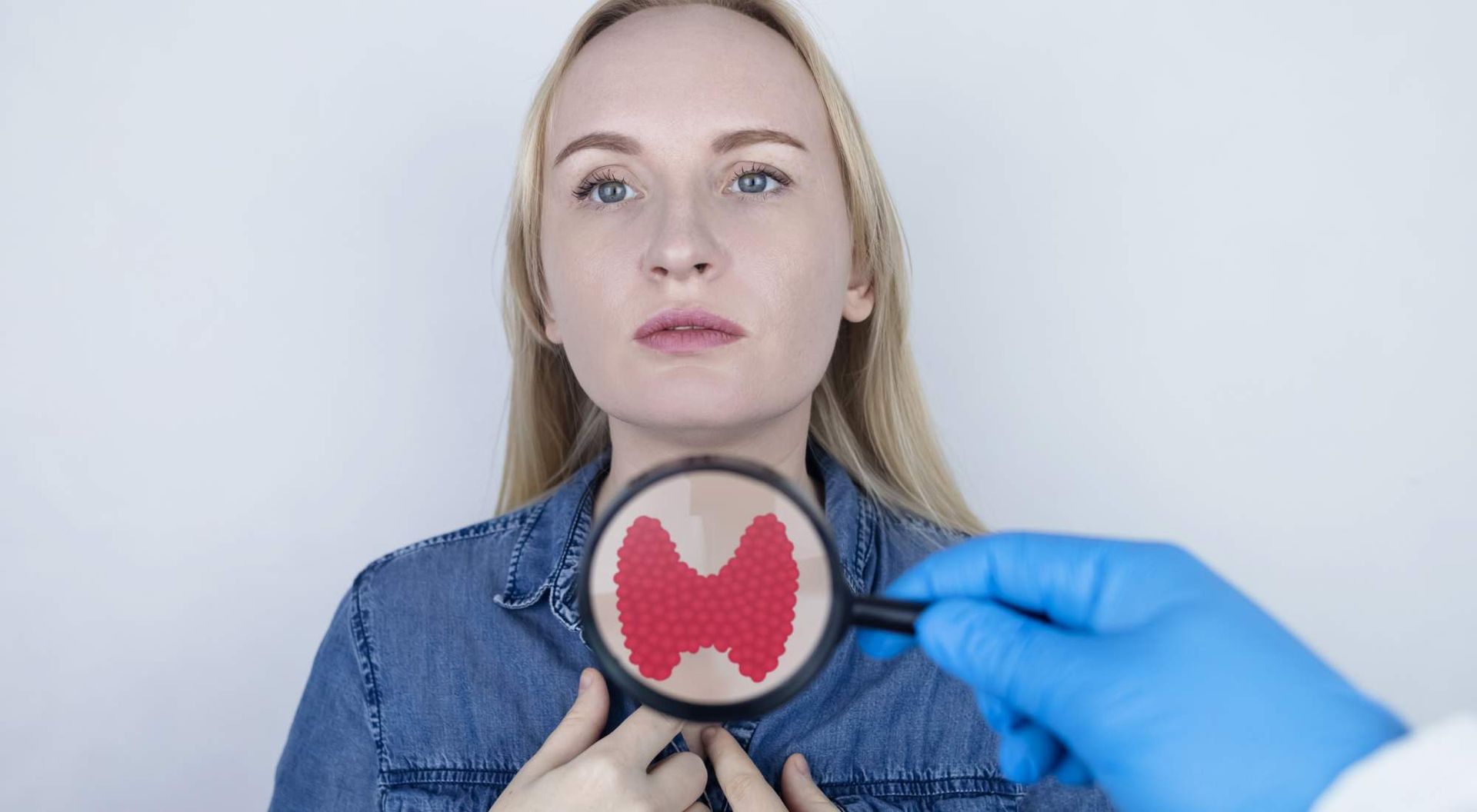Male Thyroid Health: 11 Signs of Thyroid Issues in Men
"The content below is not intended to be a substitute for professional medical advice, diagnosis, or treatment. Always seek the advice of your physician or other qualified health provider with any questions you may have regarding a medical condition."
Are you a man who’s struggling to cope with the new normal of living life with a thyroid problem? It can be a disheartening struggle, as many of the symptoms make working toward wellness all the more difficult.
There is a way to give your body a boosting head start on the path to better health, and it is completely in your power to accomplish it.
HealthierU explains how thyroid issues affect men specifically, and how holistic nutrition can help you manage your thyroid condition and enjoy optimal health.
Table of Contents
What Causes Thyroid Problems In Males?
Thyroid problems in males may result from any of the following:
- Autoimmune diseases, such as Graves’ or Hashimoto’s
- Deficiency or excess of iodine
- Hereditary or congenital conditions
- Some medications, radiation therapy for the head and neck, and thyroid surgery
- Conditions that cause thyroiditis, goiter, or thyroid nodules
HealthierU has served many patients and is well-versed in the experiences that accompany male thyroid problems.
Call us today to schedule a free consultation and begin learning how you can make natural lifestyle changes that improve your health and lead to greater contentment even in the midst of your condition.
11 Signs of Thyroid Issues In Men
The following symptoms are commonly experienced by men with thyroid disorders.
#1: Hair Loss
Untreated thyroid conditions can lead to dry, brittle, and/or thinning hair. Any disruption in the production of thyroid hormone may affect hair development at the root level. It is normal to lose about 50–100 hairs in a day, but if those are not replaced by new hairs, detectable hair loss may result.
Hair loss associated with thyroid issues generally occurs uniformly all over the scalp, rather than in patches. However, autoimmunity is often the cause of thyroid issues and can make patients more susceptible to developing other autoimmune conditions, such as alopecia, which causes hair loss to occur in distinct circular patches.
Fortunately, hair loss caused by a thyroid disorder is usually temporary, and medication stimulates regrowth.
#2: Decreased Muscle Mass
Thyroid hormone is critical in the development of skeletal muscle and in the regulation of energy availability and consumption in the musculoskeletal system. Various myopathies (muscle diseases) and even atrophy (muscle deterioration) — especially affecting the thighs, shoulders, and neck — have been found to result from the deficiency of thyroid hormone. However, hyperthyroidism can also adversely affect skeletal muscle.
Signs of myopathy include:
- Muscle weakness and wasting, especially at the hips and shoulders
- Muscle pain, including stiffness and cramping
- Slowing of reflexes
- Rhabdomyolysis, or acute muscle breakdown (a life-threatening condition)
Low-impact aerobic exercises and nutrients/supplements that target skeletal muscle may help muscles regain strength and function.
#3: Low Sex Drive
Over
60% of men with hypothyroidism experience lower libido as a result of lower testosterone. Depression and fatigue, symptoms associated with thyroid disorders, can also contribute to this problem.
Normalizing thyroid hormone levels has been shown to restore sex drive and satisfaction.
#4: Gynecomastia (Enlarged Breasts)
Gynecomastia is the excessive proliferation of glandular tissue in the male breast due to a high proportion of estrogen. Although it usually results from other causes, hyperthyroidism is a known cause, occurring in 25-40% of men with Graves’ disease (the autoimmune disease that leads to hyperthyroidism).
Hyperthyroidism may cause decreased androgen levels and overproduction of estrogens, leading to the high estrogen ratio that induces gynecomastia.
#5: Erectile Dysfunction
Erectile dysfunction, the inability to get or maintain an erection, may stem from:
- Endocrine disorders (such as hypothyroidism and hyperthyroidism)
- Lifestyle choices, including:
- Alcohol or drug abuse
- Poor diet
- Smoking
- Conditions that affect the nervous system, including:
- Strokes or spinal injuries
- Neurological disorders, such as Parkinson’s
- Diabetes
- Diseases that affect blood flow, including:
- Diabetes
- High blood pressure
- Atherosclerosis
Because of the multifaceted nature of this condition, it can be difficult to determine the cause. Thyroid function tests can indicate whether erectile dysfunction is due to a problem with the thyroid.
The main reasons that thyroid problems lead to erectile dysfunction are due to interference with sex hormone production and weakening in the production of molecules that regulate the function of blood vessels in the penis.
If you are experiencing erectile dysfunction and think it could be occurring secondarily to a thyroid issue, you can expect things to return to normal once you begin treatment.
#6: Delayed Ejaculation
Hypothyroidism is the thyroid disorder most commonly associated with delayed ejaculation. This is because of its effect on testosterone levels.
This may occur by way of disruptions in the hypothalamic-pituitary-gonadal
axis, but other mechanisms have been proposed as possibilities.
#7: Premature Ejaculation
Premature ejaculation, occurring in 2 minutes or less, can be a result of:
- Urologic problems
- Hypersensitivity
- Low serotonin levels
- Hypersensitivity
- Medical conditions, including thyroid conditions and diabetes
Hyperthyroidism is the thyroid condition usually associated with premature ejaculation, affecting — according to one
study — 30 out of 43 hyperthyroid men. 24 of these reported drastic improvement after achieving normal thyroid hormone levels.
#8: Testicular Atrophy
There are many potential reasons for testicular atrophy, or shrinking of the testes, including:
- Age
- Testicular cancer
- Alcohol abuse
- Hormone imbalances
- Varicocele
- Orchitis
With respect to hormone imbalances, thyroid issues can result in lower testosterone production and cause the testicles to shrink. There are various other things that can suppress testosterone production, including anabolic steroids and some medications.
Thyroid hormone is
critical in the processes involved in testicular development and function. As such, low thyroid hormones can interfere with these processes and result in atrophy.
#9: Infertility
Infertility, or the inability to conceive a child, may be — like each of the symptoms already listed — the result of many different factors. Those related to thyroid function occur for the following reasons:
- Hyperthyroidism is generally associated with low semen volume and reduced sperm density and motility.
- Hypothyroidism is generally associated with low sperm count and poor sperm quality.
Other factors contributing to infertility include those already mentioned – erectile dysfunction, delayed or premature ejaculation, and testicular atrophy. Combined, these factors make it difficult for men with untreated thyroid issues to conceive.
#10: Spine and Hip Fractures
One of the functions of thyroid hormones is regulating bone density. Changes in thyroid-stimulating hormone and thyroid hormone levels, particularly those caused by an
overactive thyroid, can lead to decreased
bone mineral density, which increases the risk of fractures.
#11: Depression
If you are losing interest in daily activities and feeling sad and hopeless for longer than two weeks, you might be experiencing depression.
The thyroid produces hormones that regulate metabolism, weight, and mood. Abnormal levels of these hormones may contribute to
depression. Moreover, other symptoms of thyroid issues — fatigue, weight fluctuation, irritability, and sleep problems — can exacerbate depression.
The Connection Between Thyroid Issues and Male Hormones
How exactly do thyroid issues affect male hormone levels? We’ve seen trends — low testosterone, or excess estrogen — but why does this occur?
The thyroid hormones triiodothyronine and thyroxine direct the production of sex hormone-binding globulin (SHBG). This protein is produced in the liver and controls the amount of sex hormones in circulation. It binds to three sex hormones — estrogen, testosterone, and dihydrotestosterone, with the most affinity for the latter two — and thus inhibits their function, leaving the “free” hormones available in circulation.
SHBG levels are normally twice as high in women than in men in order to limit women’s exposure to androgens. These levels decrease with hypothyroidism (leading to more free testosterone, which aromatizes and is converted to estrogen) and increase with hyperthyroidism (leading to low levels of free testosterone).
High estrogen and low testosterone levels contribute to many of the effects described above.
Signs of Thyroid Issues in Men vs. Women
According to the American Thyroid Association, women are 5–8 times more likely to have thyroid disorders than men.
Many of the symptoms of thyroid disease are shared by males and females. These often occur in sets of opposites, depending on whether the thyroid is underactive or overactive:
- Diminished sweating or increased sweating
- Weight gain or weight loss
- Depression or anxiety
- Cold intolerance or heat intolerance
- Fatigue or insomnia
- Heavy or absent periods
- Dry skin and hair
- Muscle pain, stiffness, or weakness
The male reproductive system, however, receives quite a hit from thyroid conditions, such that men experience a host of symptoms that women with the same conditions do not.
Many of these symptoms may be overlooked or considered to be symptoms of other conditions, such as depression, aging, or weight problems. For this reason, it may be necessary to insist on thyroid function tests to determine the root cause of the symptoms you are experiencing.
Diagnosis may be based on a combination of blood tests, physical exam results, and imaging. Once you begin treatment, there is good reason to hope that many of your symptoms will improve.
Options for Treating Thyroid Issues in Men
Here are some options to begin to address the symptoms of hyperthyroidism or hypothyroidism:
- Antithyroid medications or thyroid hormone replacement medication
- Surgery to remove all or part of the thyroid and subsequent thyroid hormone replacement
- Radioactive iodine therapy
- Holistic nutrition, including a gluten and sugar-free diet, probiotics, and vitamin and mineral supplementation
HealthierU: Helping Men Manage Thyroid Issues Through the Power of Holistic Nutrition
If you are dealing with any of these signs of thyroid issues in men, don’t hesitate to consult HealthierU for support.
Known for providing excellent hypothyroidism treatment in Brooklyn, we also serve patients with other hormonal issues and physical conditions, including lower back pain, digestive issues, acne, acid reflux, constipation, and hair loss.
Dr. Donna Sergi is a holistic nutritionist and chiropractor who has practiced for over 25 years, helping her patients restore their health safely, naturally, and effectively. You will be encouraged to take advantage of the power of a diet and supplementation program to allow your whole body to work at an optimal level.
To address the unsatisfactory symptoms of thyroid disorder that have negatively impacted your quality of life, visit HealthierU and start your journey to improving not only these but also your overall health.






